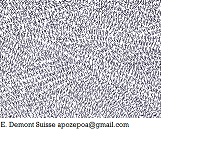Main menu
HELP
|
The history of languages and the history of linguistic representations Conference co-organised by GEHLF, HTL, SIDF and SHESL Programme organisers: Wendy Ayres-Bennett, Bernard Colombat, Bernard Combettes, Valérie Raby, Gilles Siouffi Partners: SHESL (Société d’Histoire et d’Épistémologie des Sciences du Langage), Société Internationale de Diachronie du Français (SIDF), laboratoire « Histoire des Théories Linguistiques » (HTL, UMR 7597, Université Paris-Diderot Paris 7, Université Sorbonne nouvelle Paris 3), Groupe d’Études en Histoire de la Langue Française (GEHLF/STIH, Université Paris-Sorbonne) With the support of the Labex EFL (Empirical Foundations of Linguistics). Dates: Thursday 21 January 2016 to lunchtime on Saturday 23 January 2016 Place: Université Paris-Sorbonne and Université Paris-Diderot Contact : shesl-htl2016@sciencesconf.org
CALL FOR PAPERS Given the way disciplines are structured, the history of linguistic thought and the history of different languages have often been treated in parallel, and the intersections and convergences between them have not been properly examined. However, this was not always the case. Ferdinand Brunot’s monumental History of the French Language, for instance, moves constantly between these two domains. More recent examples for French are provided by the work of Jean Stéfanini (1962) or Jean-Pierre Seguin (1993). And in another tradition, the case of Steinthal (1890-1891) may be seen as a model case of this double focus on the history of a language and the history of its analysis. The availability today of large-scale corpora, both for the analysis of linguistic usage and for the study of metalinguistic texts, should make this confrontation easier. How far have the new methodologies developed both for the history of languages and for the history of linguistic ideas given fresh impetus to the exploration of the relationship between the two disciplines? This conference aims to examine the diverse ways in which these two fields, each with its own approach, interact. We welcome papers which address the following questions: 1. General questions How does the language state influence contemporary representations of the language? What representation of the history of languages is provided by linguistic theories? Do metalinguistic texts (of different kinds including works on spelling, lexicons, teaching dialogues, dictionaries, volumes of remarks, grammars, languages treaties, translation methods, etc.) play a prescriptive role? What part do they play in the process of standardisation, the establishment of reforms, etc.? What place is given to linguistic data of a historical nature in the exemplification and theoretical reflections of a grammarian or linguist? 2. What place is given to the history of the language and to the history of linguistic thought in contemporary grammars (whether already published or being developed)? 3. How have certain linguistic traditions conceived the history of their languages when these are viewed as ahistorical, revealed or unchanging? 4. What are the situations (or contexts) which favour or necessitate reference to the “other” discipline or promote exchanges between the two disciplines? Conversely, when is it possible for them to remain autonomous? 5. What is the basis for the construction of the disciplinary fields of the history of the language and the history of linguistic thought? Depending on the tradition (according to period, place, institutional history, etc.), which option is preferred? - complete autonomy of the two disciplines? - subservience of one discipline to the other? - interaction or mixing of the two disciplines ? Is it possible to identify ‘key texts’ in the history of these relations? We might think of Saussure’s Course in General Linguistics, of Brunot’s History of the French Language, or of the works of Ascoli (1874) or Tullio De Mauro (1963, 2014). Which notions allow us to explore these relations? To what extent are the oppositions between internal and external history or language as an artefact and language as a system useful? To what extent has socio-historical linguistics renewed the relationship between the two fields? 6. How should we treat the articulation between the history of the language and the history of linguistic thought in the case of languages with an oral tradition? The linguistic description of languages with an oral tradition is underpinned by descriptive and metalinguistic categories, with a history which differs from that of grammars for languages with a written tradition. How should this history be described? 7. What does recent reflection around certain mechanisms of language change – such as analogy, reanalysis, grammaticalization, lexicalization, pragmaticalization, constructionalization, etc. – contribute to the study of particular linguistic features or to thinking about the reasons for and the nature of linguistic change in general? How far do these concepts, exploited both in a synchronic perspective and in studies of the history of the language, shed fresh light on the Saussurian dichotomy between synchrony and diachrony?
Sample bibliography
|


